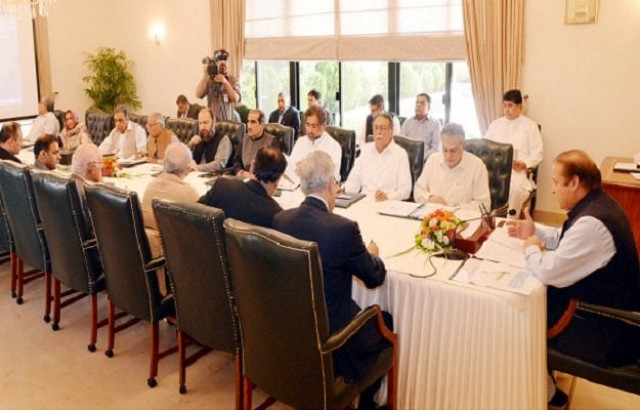Displeased over power cuts: PM mulls imposing ‘energy emergency’
Cabinet Committee on Energy given a few more days to come up with alternatives

The CCE also reviewed the power supply situation in Karachi. PHOTO: INP
On Thursday morning, Prime Minister Nawaz Sharif faced an impossible choice: continue abiding by government rules on transparency and watch his plans for solving the chronic energy crisis whither on the vine of bureaucratic delays, or suspend those rules by declaring an ‘energy emergency’ and risk legal and political challenges in a bid to speed up progress on his election promise of ending load-shedding in Pakistan. After a three-hour meeting of the Cabinet Committee on Energy, which included an angry outburst from the premier, it appears that Nawaz is leaning towards the latter, more drastic option.
The 16th meeting of the CCE started ordinarily enough, with the water and power ministry delivering a PowerPoint presentation to the prime minister on the status of the current energy infrastructure, as well as progress on new power generation projects throughout the country. Yet after having presided over a meeting following a weeklong heatwave that has claimed hundreds of lives over the last few days, Nawaz was in no mood to sit through a presentation. According to sources privy to the CCE deliberations, he lashed out at the committee and told the bureaucrats delivering the presentation to stop their projector.

Read: ‘Government committed to overcoming energy crisis’
Then, as the room sat quiet, Nawaz proposed his idea: suspend the Public Procurement Regulatory Authority’s (PPRA) rules on transparency in order to speed up the process of setting up new power plants in the country. The premise of the prime minister’s idea is that PPRA’s rules require at least six months for the government to buy any equipment, which significantly slows down the process of increasing power generation capacity on the mostly state-owned electricity grid. The premier argued that, as the nation’s chief executive, he should be allowed to suspend PPRA’s rules and declare an ‘energy emergency’.
The idea was immediately opposed by Finance Minister Ishaq Dar and the Prime Minister’s Additional Secretary Fawad Hassan. Both acknowledged that while a case could be made for giving the prime minister such emergency powers to suspend transparency rules in a bid to shorten the procurement timelines, such an idea would be disastrous politically and may even provoke a legal challenge in the courts.
Dar and Hassan argued that the move would be pilloried in the media, not just by the opposition, but also by journalists and opinionmakers. And if the ruling Pakistan Muslim League Nawaz loses the 2018 election, the next administration could easily drag senior members of the Nawaz government into court for violating the procurement rules.
The PPRA is an autonomous body endowed with the responsibility of prescribing and monitoring compliance with government rules on procurement. Under the 2004 Public Procurement Rules, it takes a minimum of six months for the government to buy anything, in a process designed to ensure transparency and prevent corruption. However, the rules also prevent any government projects from being completed rapidly.
Read: Energy to figure high during PM’s trip to Tajikistan
Both Nawaz and Punjab Chief Minister Shahbaz Sharif, who is also a member of the CCE, refused to back down from the idea and so Dar and Hassan decided to split up to try to convince both brothers to abandon this proposal. Dar spoke to the prime minister and Hassan sat down with Shahbaz. Yet after three hours, both were adamant that they should go ahead with imposing an ‘energy emergency’. The only concession they granted was that the premier would not impose the emergency immediately and give the rest of the CCE a few more days to find ways to speed up progress on the government’s power generation projects. Following the debate, the CCE also spent some time discussing other matters, including a review of the government’s power generation and transmission projects. The CCE also directed the water and power ministry to devise plans to improve the distribution infrastructure of state-owned utility companies.
The CCE also reviewed the power supply situation in Karachi, which is supplied by the nation’s only privately owned utility, K-Electric. While the CCE rejected the idea of re-nationalising K-Electric, they did say that the government would appeal the Sindh High Court’s stay order against the state-owned National Transmission and Dispatch Company (NTDC) in the Supreme Court. K-Electric had an agreement to buy 650 megawatts from the NTDC, but that agreement expired in January. The government wanted to end the supply at that time, but K-Electric was able to get a stay order until a new agreement is negotiated. The CCE decided that the new agreement should include provisions that require K-Electric to fully utilise its own power generation capacity before buying electricity from NTDC.
Published in The Express Tribune, June 26th, 2015.





1724319076-0/Untitled-design-(5)1724319076-0-208x130.webp)













COMMENTS
Comments are moderated and generally will be posted if they are on-topic and not abusive.
For more information, please see our Comments FAQ